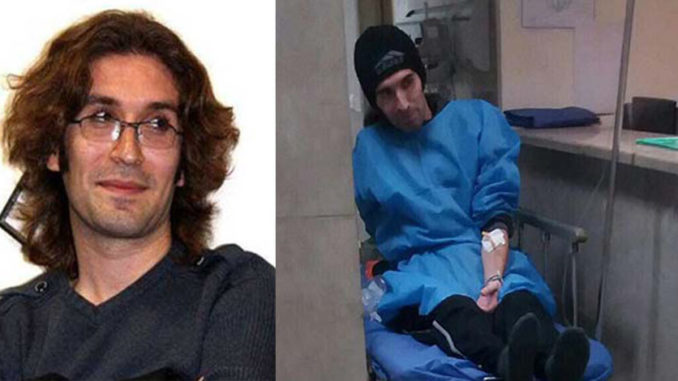
Despite urgent need for medical attention, critically ill prisoner of conscience and human rights defender Arash Sadeghi, was returned back to prison only three days after a complicated surgery and despite his further need of special medical care.
Human rights defender and prisoner of conscience Arash Sadeghi is critically ill in an Iranian prison. The 38-year-old shopkeeper has a rare form of bone cancer and had an operation just over a month ago.
His doctor has advised a very strict protocol so that Mr. Sadeghi could receive adequate care and treatment. The doctor said that the patient must remain in hospital for more than 25 days after the operation because of the high risk of infection or other complications that could arrive after the surgery.
The surgery was complicated, involving the removal of a bone tumour and the collection of a number of bone samples.
However, the post-surgical treatment that Mr. Sadeghi received was inhumane. Instead of being monitored in hospital for at least three weeks on the recommendation of the doctor, he was taken by authorities back to prison after only three days.
Furthermore, once the surgery had finished, the authorities denied him the opportunity to stay in the recovery room as per protocol, and they handcuffed and shackled him. Regime agents also prevented doctors from getting close to Mr. Sadeghi meaning they could not adequately carry out the frequent post-surgery examinations he required.
It was also reported that security agents only permitted access to a bathroom three times a day and each time he had to be accompanied.
It has now been made known that the prison authorities continue to jeopardise his recovery from the surgery. A follow-up appointment was delayed by two-weeks and he developed an infection in the meantime.
While travelling to the hospital, Mr. Sadeghi was abused – both verbally and physically. His handcuffs were tightened and his arm was twisted. The agents accompanying him also insulted him. At the hospital, in the presence of medical professionals, he was punched in the arm that was underwent surgery. Hospital staff, of course, queried this treatment to which the agents responded that they were ordered to do so by the prison director.
The doctors recommend that Mr. Sadeghi starts chemotherapy in a calm and relaxed environment – something that is almost certainly not going to be granted to him in prison considering the treatment he has received so far. To recover, the doctors say that a medical furlough is really the only option, but it unlikely that he will be granted it.
Prison authorities were made aware of Mr. Sadeghi’s injuries that were inflicted upon him by those accompanying him to the hospital however they have failed to react.
The treatment of a prisoner like this is horrific but it is unfortunately nothing new. It is all too common in Iran and it is something that human rights organisations have been highlighting for many years.
More and more prisoners in Iran, especially political prisoners, are bravely speaking out about the conditions that they face. Many are also participating in hunger strikes. They cannot participate in the protests that are taking place every day across the country, but they are contributing in whatever way they can from behind bars.

